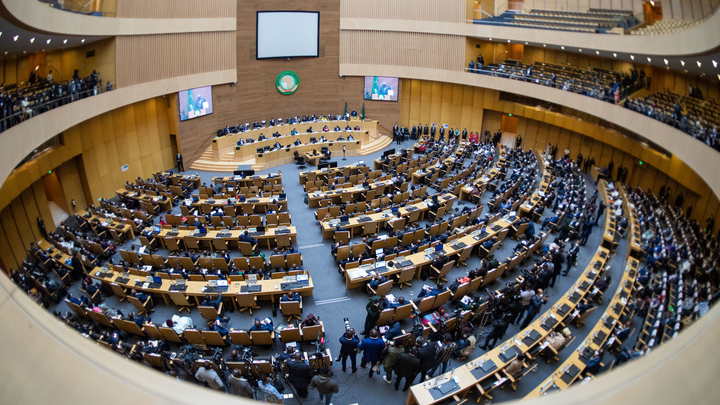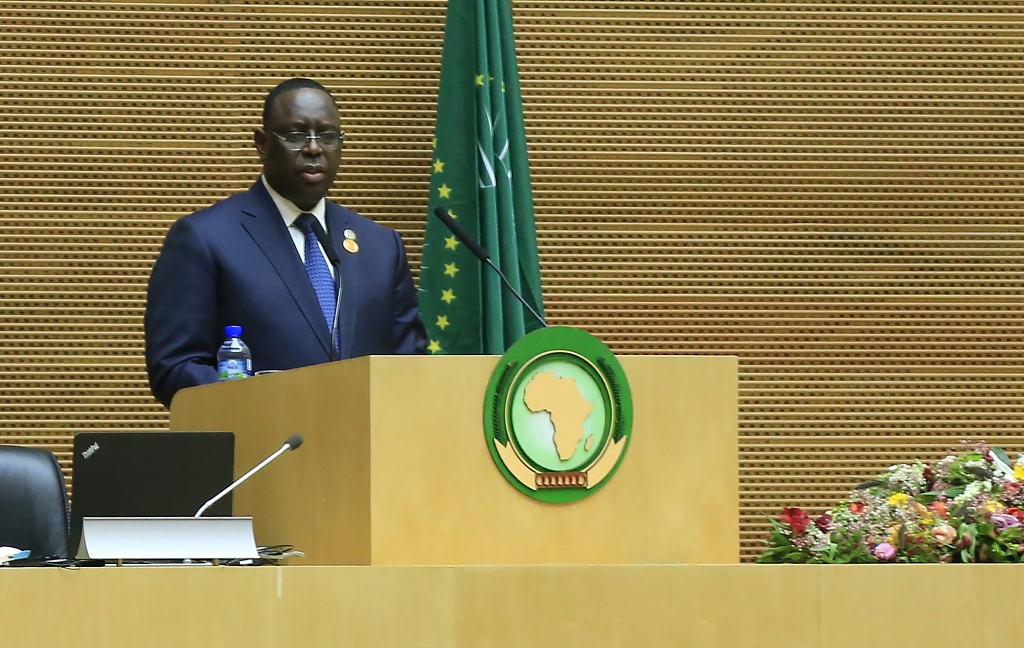
The 35th Ordinary Session of the African Union Assembly in Addis Ababa, Ethiopia, February 5, 2022. /Xinhua
The 35th Ordinary Session of the African Union Assembly in Addis Ababa, Ethiopia, February 5, 2022. /Xinhua
Editor's note: Fikrejesus Amahazion is an educator and research analyst at the Eritrean Center for Strategic Studies in Asmara. His areas of interest include human rights, political economy and international development, with a particular focus on Africa. The article reflects the author's opinions and not necessarily those of CGTN.
African heads of state and government gathered at the African Union (AU) headquarters in Addis Ababa, Ethiopia, this past weekend for a two-day summit. The 35th summit of the 55-member bloc, representing the continent's supreme policy- and decision-making organ, comes as it prepares to celebrate its 20th anniversary later this year.
Notably, it is the first to be held in person following a one-year hiatus in 2021, when it was forced into a virtual format due to the COVID-19 global pandemic. While the guiding theme of this year's gathering was, "Building Resilience in Nutrition on the African Continent: Accelerate the Human Capital, Social and Economic Development," a number of different topics drew considerable attention, namely COVID-19 and the recent spate of unconstitutional changes of government.
COVID-19 global pandemic
Unsurprisingly, the ongoing worldwide pandemic remained high on the issue agenda throughout the weekend. Although, according to UN News, global vaccine supplies to Africa have risen significantly – last month alone, 96 million doses were shipped to the continent, which is more than double that of six months ago – the continent is still far behind much of the rest of the world and it is heavily struggling to expand rollout.
According to the Africa Centers for Disease Control and Prevention, as of January 26, only about 11 percent of the continent's approximately 1.3 billion people were fully vaccinated. The continent's COVID-19 vaccination rate needs to increase six-fold if it is to meet the 70 percent target set for the middle of this year.
What is more, the continent could be left even further behind during the global economic recovery. The pandemic led to a contraction in growth of about 2.1 percent in 2020, as well as an increase in the debt ratio by 10 points of GDP. Output in 2021 was about 3.5 percent, yet remains fragile. Additionally, recurrent waves, increasingly likely due to low levels of vaccination and threat of emerging variants, could severely exacerbate financing crises for many African countries.

President of Senegal Macky Sall gives a speech during the 35th African Union Summit in Addis Ababa, Ethiopia, February 6, 2022. /CFP
President of Senegal Macky Sall gives a speech during the 35th African Union Summit in Addis Ababa, Ethiopia, February 6, 2022. /CFP
Indeed, in his inaugural speech as the new chair of the continental body, President of Senegal Macky Sall emphasized that the continent needs additional financing of around $250 billion by 2025 to cushion the shock of the pandemic and aid recovery.
It is vital, then, that more is done to reduce vaccine inequity and ensure that Africa is not left out. Solidarity, partnerships, and donations must not only continue, but be scaled up. Various operational challenges, logistical issues, and different bottlenecks should be removed in order to increase the speed of vaccine delivery and expand absorption capability.
As well, raising uptake and reducing wastage will require more efforts to build trust and strengthen confidence within communities. It is important, however, to be clear that this is not to suggest that hesitancy, rather than lack of availability or logistics limitations, has been the main driver of low vaccination rates. Importantly, there are also initiatives being taken on the continent to protect Africa's "vaccine sovereignty" by building its capacity to locally manufacture and distribute vaccines.
Raising vaccination coverage rates quickly will help to promote recovery and regain many of the setbacks on progress in poverty reduction and development. The continent should also leverage its vast natural resources, while both national and international finance systems need to be reformed. The former can be made more equitable, while African countries need to improve the quality and efficiency of their banking and finance. The international debt architecture must also be addressed, in order that vulnerable countries can obtain the vital relief required to promote recovery and build resiliency for the future.
Spate of coups
Another issue of focus during the summit was the recent significant increase in unconstitutional changes in government on the continent. While coups had been in decline during the past 20 years, military figures in the last year-and-a-half conducted takeovers in five countries: Burkina Faso, Chad, Guinea, Mali, and Sudan. Just last week, gunmen also tried to overthrow the president of Guinea-Bissau in a violent attack that lasted for hours but ultimately failed.
On Sunday, Bankole Adeoye, the head of the AU's Peace and Security Council, told a press conference that, "Every African leader in the assembly has condemned unequivocally ... the wave of unconstitutional changes of government." He went on to add, "Do your research: At no time in the history of the African Union have we had four countries in one calendar year, in 12 months, be suspended," in reference to the four countries (namely Burkina Faso, Guinea, Mali, and Sudan) that have been suspended from the bloc as result of illegal power grabs.
While much is made of the idea of a "coup contagion," there is actually a mix of underlying factors that have driven these developments. These include: growing violence from extremists, power grabs and inequality, weak governance, repression and corruption, and a failure on the part of leaders to respond to popular demands populations.
As well, although condemnations after the fact may be well and good, proactive approaches by the AU and its member states to ensure that the basic expectations of the population are met would be more effective.
(If you want to contribute and have specific expertise, please contact us at opinions@cgtn.com.)

